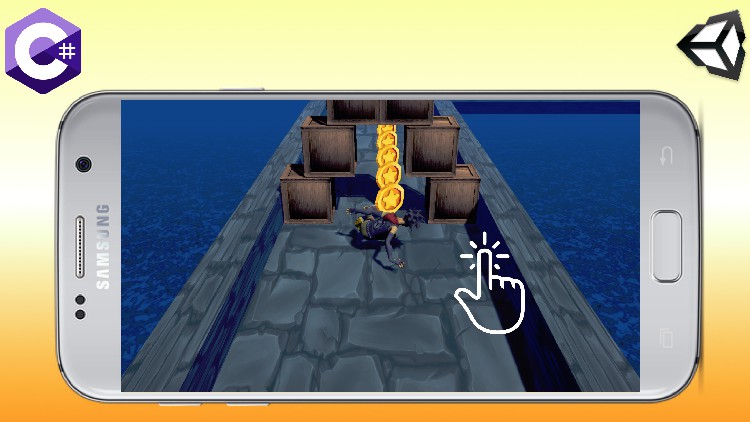Top Unity3D Course | Temple Run Style Game for iOS & Android
In less than 5 hours, you can create a cross-platform endless runner game for iOS and Android using the Unity game engine.
What you’ll learn
Top Unity3D Course | Temple Run Style Game for iOS & Android
- Using the Unity C# syntax to make 3D games lets you control how your game objects (called “assets”) act inside of Unity.
- Learn how to make your game responsive to touch gestures and the phone’s accelerometer, and how to adapt it to both iOS and Android.
- The logic and mechanics of games with unending runners, such as Temple Run.
- How do you bring 3D objects into Unity and set them up so you can make the setting for your game?
- How to use the Unity Mechanism system to make your character move, which will give your game more life and interactivity.
Requirements
- Previous knowledge of basic programming concepts in any language, such as the types and declarations of variables, for loops, etc.
- On a Mac or PC with basic specifications.
- A Unity installation is already made (free).
- A version of Visual Studio is already installed (for Mac and Windows users).
Description
Curriculum Description
Your introduction to 3D graphics, which are the foundation of game production, virtual environment construction, and character animation, will be provided via this project-based course. The Temple Run clone you create after finishing this course will be cross-platform, portable, and have gorgeous, fluid visuals and animation (not like those cheap ones you find on blogs 😉
Topics on game development that are covered in depth in this course include:
Classes, objects, public and private data members, constructors, inheritance, and many more concepts are all part of object-oriented programming (OOP).
- arrays in C#.
- # lists in C
- # Strings in C
- C is the key.
- A significant C# variable type represents every significant C# variable type, including ints, floats, bools, and others.
- Unity components and game object
- assets as they relate to game development.
- The Unity prefabs idea
- maximizes the use of the Unity Asset Store.
- The foundational elements of 3D modeling include polygon counts, textures, and materials.
- The idea behind a skybox
- Utilizing the Unity Animation System for character animation (Mechanism).
- state machines for animation.
- Events in Unity Animation
- Unity scripts in C#.
- various Unity user interface (UI) components, including buttons, pictures, and text.
- There are several Unity classes, such as CharacterController, Animator, Transform, Vector3, and many more.
- detection of collisions.
- The Randomness of Unity
- video game cameras as an idea.
- Various game input methods, including keyboard keys, mobile touch input, and accelerometer input,
- To learn how to utilize Unity effectively, go to the manual.
- Utilizing the Unity Console window to troubleshoot the game
- launch various scenes (levels).
- is the process of creating or exporting a game from a Unity engine project to an app that can run directly on Android and iOS devices.
- C# grammar.
- For-loops.
- typecasting # C
- Enumeration structures similar to an enum in C#
- IEnumerator and other co-routines and interfaces in C
- Constructing the game’s user interface (UI) in Unity utilizing various UI components, such as graphics, text, panels, and buttons
- Local (automatic) variables and global variables in C
- There is a game save function in Unity.
- IMGUI stands for immediate graphical user interface for unity.
- the endless runner game genre’s mechanics.
- aural effects (SoundFX).
- script-to-script communication in Unity.
Partially covered topics in this course in game development include:
- a 3D coordinate system.
- Examples of 3D rotation math include quaternions and Euler angles.
- Discrete mathematics
- The Unity Fog System and the idea of particle systems in game development
- Video game visual effects (VFX)
- keys and other more sophisticated data structures.
- Overworked operators
- Interpolation using linear equations
If you finish this course, you will not only learn how to make 3D games in Unity, but you will also improve the following skills:
- Problem-solving
- Abstract reasoning and logic
Who this course is for:
- Those looking to launch their independent development careers
- Those that just like creating stuff






